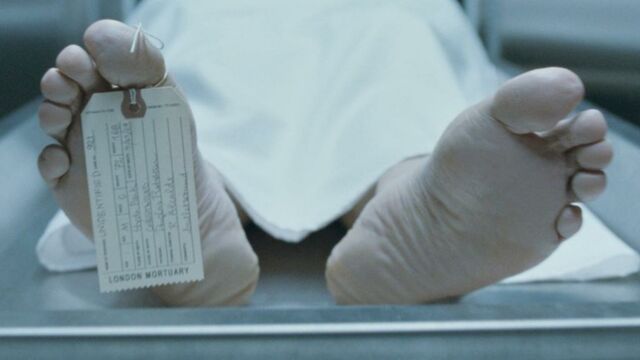If you’ve ever watched a procedural crime show like NCIS or Bones then you definitely know what an autopsy looks like. Or at least you think you do…
Discover our latest podcast
In their series Minutes With, LADbible interviews Carla Valentine, a British mortician about her job. In the 19-minute-long interview, Valentine goes over different aspects of her profession such as the smell, the tools she uses, what she does with the organs and the weirdest things that might happen to a dead body.
If you have ever wondered about whether TV shows are accurate this article is bound to satisfy your curiosity. Let’s get into the heart of things! (Pun intended)
Mortician: explained
First of all, before we get into all the technical aspects of things it seems important to actually understand what a mortician does. What we think of, when we think of autopsies, is often what we see on TV— a Y incision and some scraping under the nails. But there is so much more.
Valentine explains that her job has a lot of different aspects. According to Globe Locums morticians ‘can play important roles in assisting pathologists with post-mortems to help understand the cause of death.’ Valentine herself says that she would ‘weigh the body, measure and undress it’ before the pathologist enters the room to perform the post-mortem.
She continues that, as a mortician she is the one who does the incision and the evisceration. Basically, she surgically removes all the internal organs so that they can be examined. She then places them back into the body and rearranges it so it can be transferred to a funeral home where they will make it look its best for the funeral.
A mortician is also in constant contact with the family of the deceased and ensures that, if they want to see the body before it goes to a funeral home, it looks presentable.
Is TV getting it right?
If you decide to watch the video, it is highly possible that your mind will replay autopsy scenes from shows you have watched. At least that’s what happened to me. As Carla Valentine was talking about her job I kept seeing things that shows did wrong.
First of all, Valentine talks quite a bit about the tools her job requires. One of the things that is the most surprising is the use of a ‘PM40.’ This tool she describes saying that it is kind of like a scalpel but bigger. Indeed, the PM40 is 3 inches long and is used to perform the famous Y incision. In most shows the coroner or mortician uses a simple scalpel to do that.
Moreover, part of the mortician’s job is to handle a bone saw which is the same as doctors use to remove a cast that’s been placed around a broken arm. The saw is not the big rotating one you see on TV. Indeed, these saws would cut through soft tissues which morticians do not want when they open a skull.
Finally, the other main difference is the fact that on TV dead bodies are awfully quiet. Valentine however sets the record straight.
Dead bodies make noise such as ‘flatulence’ or what is called ‘voiding of the bowels.’ She says that all these are part of what morticians do and deal with and those things help them determine causes of death just as much as any other aspects of the job.
What does a dead body smell like?
Part of the interview is asking Carla Valentine questions that are on most people’s lips.
The interviewer therefore asks Valentine:
Is there a bad smell? How do you deal with it?
Valentine who, throughout the whole interview is calm and passionate, gives a very simple answer:
It's one of those things that you just sort of get used to.
She even continues by saying that:
Sometimes I prefer that smell to the smell on the Central line when it’s really packed
People on Twitter might tend to agree with Valentine.
This is a petition for TFL to hand out free right guard when the temperature outside exceeds 15 degrees. The smell on the central line today is unacceptable 😭😂
— George Icke (@georgeickeradio) June 10, 2023
Moreover, this question really shows one of the best qualities a mortician must have: compassion.
Carla Valentine says:
(dead bodies) smell and it’s okay. It’s not their fault and it’s scientific.
Also the smell can indicate a lot about how a person has died.
For instance we learn that alcohol smells sweet after you die. According to Valentine smell is crucial to the examination. Morticians don’t do what coroners do on TV. There is no use of Vick’s VapoRub under the nostrils because ‘you need to be able to smell the body. It’s part of the examination.’

Thinking of becoming a mortician: you’ll need those qualities
If what Carla Valentine has said so far hasn’t driven you away then you might have what it takes to be a mortician. In the last bit of the interview Valentine goes over the soft skills every mortician should have.
According to her, any good mortician must have a real ‘attention to detail’ as the job requires you to be able to pick up evidence from different sources. They might be visual, olfactive, aural or throughtouch. To become a mortician you must also be ‘resilient’ as some days are tough. And finally you will need a ‘strong stomach.’ This one is kind of obvious but she does specify that you can never really know what to expect when you walk into work in the morning. She also says that things can get messy:
you find maggots in your bra afterwards
However while all of the soft skills may sound negative, Valentine offers a very positive outlook on life.
She says:
Knowledge is power and it’s important for people to know the process of what happens to bodies once they come to a mortuary or a funeral director.
She also adds:
the more aware of death you are the more appreciative of life you are
So, are you ready to become a mortician?
Read more:
⋙ This man died after eating a slug that gave him meningitis
⋙ The ‘rare’ phenomenon that happens to your body when it decomposes
Sources:
LadBible: Mortician On The Worst Things She Has Seen | Minutes With
Globe Locums: How to become a mortician in the UK















